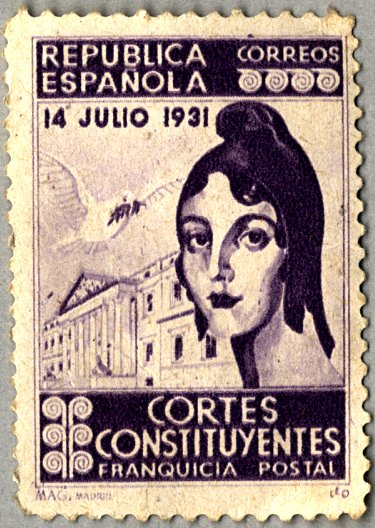Women in Klara’s Spain: Notes on Women’s History Month from Home So Far Away
Happy International Women’s Day! Klara Philipsborn mentions this day in her diary, albeit very briefly, since it arrives on the heels of the battle of Jarama. The year is 1937 and the Republic has held its own with heavy losses sustained on both sides, particularly within the Abraham Lincoln Battalion. Klara is attending to the many wounded in the military hospital of Ocaña (Toledo), a converted prison, and during mealtime (probably garbanzos) on March 8, she wishes a happy Day of the Woman to her female comrades, including the two nuns “volunteering” there, who are “apparently pleased to be regarded as women rather than disembodied spirits.”
Klara arrived in Spain to begin work at the Madrid School of Medicine in September, 1930, perfectly aware of this holiday. It was founded by her compatriot, Clara (Eissner) Zetkin, an organizer of the first international women’s congress against World War I (and also Rosa Luxemburg’s mother-in-law.)[1]
Women’s Day,, 1914, Germany. Image from https://en.wikipedia.org/wiki/International_Women%27s_Day
Though the Spain of 1930 was seeing small pockets of progress in women’s rights, the status of women was nevertheless deplorable. “Society, through the Catholic Church, dictated that the role of women was to marry, and bear children. They were to be invisible in society outside the domestic sphere.”[2] And it is that role of invisibility that leads Klara’s tiny group of female medical students to seek her out for solidarity and support. They even dub themselves “Las invisibles,” citing the way they are treated in class: Their microbiology professor restricts the women students to the front row of his lecture hall, leaving three rows of empty seats, behind which the male throngs pile in. These male students are not exactly welcoming either; they write satirical verses about those women who should be at home cooking and cleaning and changing diapers, and definitely not moving in on men’s territory.[3]
Commemorative stamp, Constitutional Congress, 1931. Image from https://en.wikipedia.org/wiki/Spanish_Constitution_of_1931#/media/File:Franchise_postale.jpg
With the defeat at the polls of the monarchy in 1931, Spain was declared a republic and a groundbreaking constitution was drafted. This document made huge strides in women’s rights, from a basic declaration of equality of the sexes to the right to hold property and to run for office, divorce, decriminalization of abortion, equal rights to education (only 10% of women were literate when Klara arrived in Spain), secular, co-ed schools, and custodial rights to their children. Women’s right to vote was not approved with the first draft, however, and Klara’s “Invisibles” debate the advisability of that right in Home So Far Away. The student Pilar takes the side of Congresswoman Victoria Kent: “Her argument against woman suffrage is that women have been so conditioned by the Church that they are incapable of making reasoned decisions. And I know a lot of women – some of them in my family – who might be described that way.”
Klara’s students are housed at Madrid’s pioneering Residencia de Señoritas, a cultural mecca for accomplished women. Directed by María de Maeztu, the “Resi” attracted guest appearances by Congresswoman Clara Campoamor, Maria Montessori, Gabriela Mistral and Federico García Lorca, among other luminaries. In keeping with other innovations in education, residents participated in sports, music, theater, and even costume parties. Here are Herminia and Pilar, enjoying a moment of drag as “Popeye.”
Herminia and Pilar, Residencia de Señoritas, ca. 1930. Photo property of Dr. Rosa Peraita Adrados, with her kind permission.
Rights were again curtailed with the election of a right-wing government, in 1933, which moved stealthily underground in reaction to the victory in 1936 of the Frente Popular, a coalition of left-wing groups. The military coup of July, 1936, set off the deadly civil war that led women to don overalls and grab rifles to defend their Republic and their hard-won rights.
The victory of Franco’s fascist forces, aided by Hitler and Mussolini, immediately forced women back to their roles as subordinates to males, backed by purges, torture, and executions. General Queipo de Llano’s direct attack on the women of Seville still arouses rage on recalling his broadcast, over Radio Sevilla: “Since women are communists and anarchists, and preach free love, they will find out who are the real men, not the militias and the ‘fairies’ – no matter how much they kick and scream.” The Pact of Forgetting imposed by Franco’s dictatorship reached across the years, stunning into silence two generations of people, a silence only recently being broken by the movement for Historical Memory.
Witnessing from Madrid the invasion of her beloved Sevilla, Klara longs for the day “when women can stroll freely along her azahar-scented streets and sing and dance and make love and sip fino.” Thanks to these brave sisters from Seville who dare to dance on the grave of the vile Queipo for breaking the silence and honoring the legacy of their mothers and grandmothers. https://www.facebook.com/watch/?v=1890287567684263
[1] Clara Zetkin did not make the cut for this edition but does appear briefly in my Spanish translation.
[2] https://en.wikipedia.org/wiki/Women_in_modern_pre-Second_Republic_Spain
[3] This information thanks to Dr.Rosa Peraita Adrados, the daughter of one of Klara’s medical students, Herminia.


